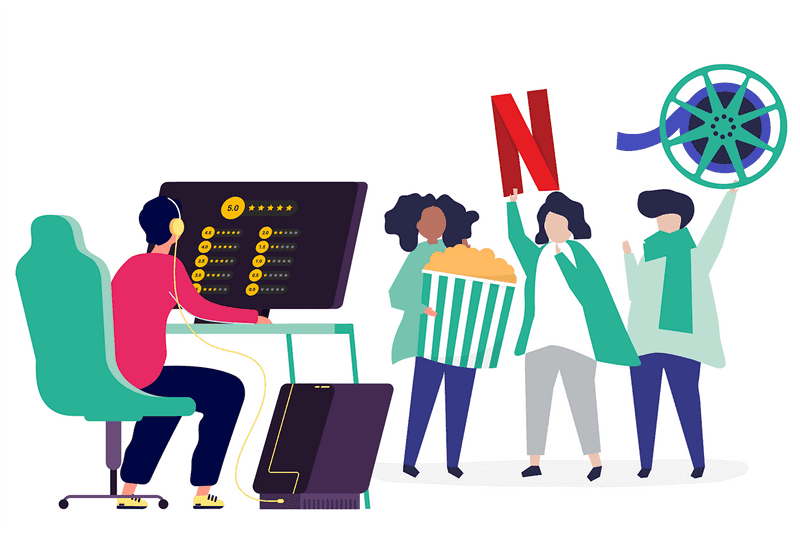What Does a Data Scientist in the Entertainment Industry Do?

In this article
Few industries are seeing as big a surge in demand for data scientists as the entertainment industry. Although largely known for its art, the entertainment industry has placed great emphasis on its science in recent years.
With streaming services, production studios, and legacy media companies collecting troves of data on production trends, users’ viewing habits, and post-production planning, data scientists hold the key to helping organizations make sense of the wealth of information they’ve gathered. It’s a role that requires equal parts technical skill, analytical acumen, and creativity—a love for movies and television also doesn’t hurt!
Learn more about the opportunities, responsibilities, and salaries of data scientists in the entertainment sector here.
How is data science used in the entertainment industry?
At its core, data science in the entertainment industry isn’t too different from data science in other fields—the ultimate goal is to tease out meaningful and actionable insights from collected data. But the specific applications of data science can differ greatly, and the entertainment industry is one where data scientists have growing influence over an organization’s trajectory.
At a surface level, data science insights can help entertainment companies with forecasting, operations research, topic modeling, user segmentation, and content recommendations. Streaming services such as Amazon and Netflix, for example, rely on data to determine what shows are greenlit and promoted. “You do not make a $100 million investment these days without an awful lot of analytics,” Dave Hastings, Netflix’s director of product analytics, said at the Wharton Customer Analytics Initiative Conference in 2015. Meanwhile, over at 20th Century Fox, data scientists have used AI to analyze movie trailers in order to determine what audiences might like. In the years since, the role of data science in entertainment has only grown.
Going deeper, data scientists can help entertainment companies optimize their decision-making by offering solutions rooted in data in place of the traditional approach of relying on human experience and intuition. For example, Netflix’s data analytics division has helped the organization with business and technical decisions such as planning budgets, finding locations, building sets, and scheduling actors. Netflix’s data scientists have also created models that allow production executives to make critical decisions using data-centric ‘what-if’ scenarios, rather than relying on their best guesses.
Get To Know Other Data Science Students
Diana Xie
Machine Learning Engineer at IQVIA
Jasmine Kyung
Senior Operations Engineer at Raytheon Technologies
Sam Fisher
Data Science Engineer at Stratyfy
Entertainment industry data scientist job roles/responsibilities
Most data scientists bring to the table technical skills such as knowledge of probability and statistics, data visualization, machine learning and AI, and proficiency with Python and SQL. And while these skills might help a person parse through troves of information, the entertainment industry expects its data scientists to also approach data sets with creativity, and be able to effectively communicate findings to those who don’t have technical backgrounds.
“Learning what is a valuable problem to solve, how to ask good questions with data, and solve problems creatively are similar and adjacent skills,” said Alyssa Zeisler, Research and Development Chief and Senior Product Manager, Editorial Tools, at the Wall Street Journal. “New entrants should [also] work on how to articulate ideas and communicate them in ways that a stakeholder is likely to understand, whether that individual relies more on numbers and anecdotes.”
In other words, a large part of a data scientist’s job is to connect relevant dots to tell a story and persuade those in charge that the insights are meaningful and worth acting on. This is where being passionate about the industry can also help, according to Daryl Kang, Lead Data Scientist at Forbes, who believes that a familiarity and fondness for the subject matter translates to better motivation at work, which can lead to more effective advocacy for data-supported recommendations.
Other common responsibilities of entertainment industry data scientists include:
- Using data and machine learning to build recommendation engines
- Defining performance and success metrics
- Developing and communicating recommendations rooted in data to non-technical members of the organization
- Designing and developing algorithms and statistical models and machine learning pipelines
- Analyzing behavioral data and identifying opportunities for growth
Entertainment industry data scientist salary
The demand for data scientists is growing at a rapid clip. Research firm Mordor Intelligence predicts that the market for marketing analytics will reach $4.68 billion by 2025, with new opportunities constantly emerging for data scientists in entertainment.
“There are many unspoken and novel applications of data science in the entertainment industry today,” said Kim Martin, a data science manager at Netflix. “But the plethora of opportunities yet to be discovered are what’s really exciting.”
The salary of a data scientist is typically determined by education, years of experience, location, and organization type. As of 2020, the average salary of an entry-level data scientist in the entertainment industry is around $85,373. The average salary of a senior-level data scientist in the entertainment industry is around $115,452.
Don’t forget to also check out Springboard’s guide on how to become a data scientist with no experience.
Since you’re here…
Curious about a career in data science? Experiment with our free data science learning path, or join our Data Science Bootcamp, where you’ll only pay tuition after getting a job in the field. We’re confident because our courses work – check out our student success stories to get inspired.





